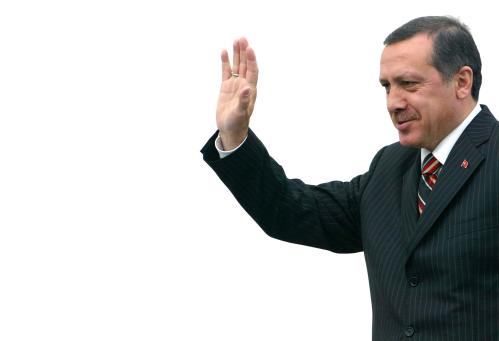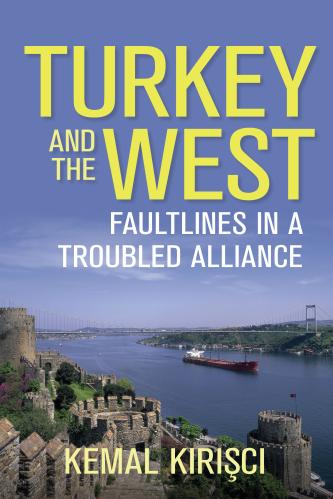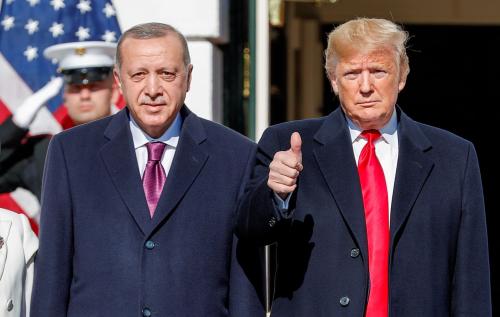Turkish President Recep Tayyip Erdoğan—who was elected mayor of Istanbul in 1994—once reportedly remarked that “who wins Istanbul wins Turkey.” The claim stands to reason: The city is home to nearly 15 percent of Turkey’s 57 million voters and accounts for 31 percent of its GDP. So when opposition candidate Ekrem İmamoğlu won the position on March 31, one can imagine Erdoğan’s disappointment.
Fast-forward to May 6, when the Supreme Electoral Board cancelled the election result, suspending İmamoğlu’s mandate setting the date for a re-run on June 23. Not surprisingly, Erdoğan immediately welcomed the decision, calling it evidence of the strength of Turkish democracy and rule of law. A pro-government journalist, meanwhile, wrote that the decision helped dismantle an (undefined) macabre international conspiracy against Turkey.
İmamoğlu’s supporters banged on pots and pans and honked their horns in the streets of Istanbul, the first widespread display of public outrage since the Gezi Park protests of 2013. Even Turkey’s former president, Abdullah Gül—a founder of Erdoğan’s Justice and Development Party (AKP)— bitterly criticized the ruling, describing it as evidence of democratic regression.
The Board’s decision brings Turkish democracy one big step closer to death, unless the re-run meets the standards of a “free and fair” election that genuinely reflects the will of the Istanbulites.
What happened?
The local, nationwide elections on March 31 produced surprise results that saw the AKP lose the mayorships in a number of important major cities (including the capital Ankara, in addition to Istanbul).
These defeats have generally been attributed to a period of intensifying volatility in the country’s economy. Voters largely weren’t convinced that the blame for Turkey’s economic ills lies with internal and external conspirators seeking to undermine a Turkey that has been otherwise ascendant under his leadership. Additionally, voters didn’t respond favorably to Erdoğan’s divisive campaign message that the “survival and continuity” of the Turkish state quite literally depended on him and his political alliance with the right-wing Nationalist Action Party (MHP). Throughout the campaign, he depicted the opposition as terrorists and traitors. Lastly, in the specific case of Istanbul, the un-glitzy but folksy and amicable style of İmamoğlu, formerly a subdistrict municipal mayor whose name was virtually unknown, provided a breath of fresh air in an increasingly aggressive political climate. This helped charm enough Istanbulites, and together they overcame Erdoğan’s efforts to ensure a win for his preferred candidate, Binali Yıldırım—a staunch loyalist and a former prime minister.
That the AKP and Erdoğan would be sore losers revealed itself even before the vote counting was completed. Turkey’s state-run Anadolu Agency abruptly stopped reporting the results after Yıldırım claimed victory over İmamoğlu with over 1 percent of the ballot left to be counted and a lead only of about 5,000 votes. Uncharacteristically, the Electoral Board stopped presenting results. However, once the tallies were completed, the Board did declare İmamoğlu the winner with a margin of almost 24,000 votes, instantly triggering objections from Yıldırım, who somehow claimed that if there were just one additional vote for him in the 31,100-plus ballot boxes, he would be the winner.
The AKP then filed a number of formal contestations with the Board, claiming irregularities at ballot stations and seeking recounts in numerous subdistricts of Istanbul. These contestations were settled, allowing İmamoğlu to receive his mandate, three weeks’ delayed. One dispute, however, claimed that some officials serving at the polling stations were not civil servants, as required by the law. This, the argument went, was part of a concerted effort to defraud Yıldırım and AKP from a win. Seven of the 11 judges on the Board relented to massive political pressure and ruled in favor of canceling the election, provoking bitter and widespread criticism. A key criticism, flagged by both the president of the Turkish Union of Bar Associations and a prominent conservative columnist, was that the Board failed to explain why it cancelled only part of the election. Unlike the race between İmamoğlu and Yıldırım, the contests for sub-district mayors, members of local assemblies, and heads of neighborhoods (mukhtars) were declared valid, even though votes for those positions were cast in front of the very same officials that AKP objected to. On this basis, İmamoğlu and the leader of the opposition IYI Party, Meral Akşener, argued that the decision was inevitably throwing into doubt the earlier presidential election in June 2018, won by Erdoğan, as well as the referendum of April 2017, which granted Erdoğan massive executive powers, as these were held in front of the same officials.
How did we get here?
The decision is not surprising when you recall that Erdoğan has pursued systematic dismantlement of the safeguards of democracy. Some observers point to the 2013 Gezi Park protests as marking the origins of his authoritarianism, yet, there is a much more organic link to the 2010 referendum, which was meant to open the way to more liberalization in Turkey. The initiative had received the blessing of the EU, as well as liberals who had worked hard to mobilize support for it with the motto “yes but not enough.” Rather than institute additional reforms as part of Turkey’s EU membership efforts, Erdoğan used the favorable outcome to introduce legislation that would steadily erode the independence of the judiciary and eventually bring it under his full control. This referendum and what followed is recognized as a turning point in Erdoğan’s efforts to consolidate his authoritarian rule.
2014 marked an even more significant turning point: Erdoğan became Turkey’s first popularly elected president (previously the parliament elected the president). He argued that he represented the will of the people and advocated replacing the parliamentary system with a presidential one.
The July 2016 failed coup attempt—widely blamed in Turkey on officers and civilians associated with the Gülenist movement—was a “gift from God” in Erdoğan’s words, allowing him to “cleanse” the army and then widen the coup response to crush remaining opposition. He also used the occasion to institute emergency regime rule, sidelining the parliament and eliminating remaining checks and balances on his power.
In a hotly contested referendum in April 2017—and with a narrow majority of just 51.4 percent— Erdoğan enshrined his de facto presidential rule into the constitution. His power is now characterized by insufficient checks and balances, excessive concentration of power in one office, limited parliamentary oversight, and a serious erosion of judicial independence. With this result in hand, in June 2018 he was elected to head this new heavily centralized system of governance.
What next?
The Election Board’s decision this week is a product of this decade-long process. In the words of a former opposition member of the Turkish parliament, the move illustrates Turkey’s transition “to outright authoritarianism, without even the semblance of ballot box democracy and rule of law.”
Erdoğan will now try to win back the city for his AKP party “by hook or by crook,” as The Economist recently wrote. The economic and political stakes are high. Yet—just like on March 31—the re-run election will not be a contest between two mayoral candidates, İmamoğlu and Yıldırım. Instead, what is really being put to a vote is the legitimacy of the Board’s decision to invalidate the first outcome and the belief in Erdoğan’s ability to deliver a “stronger, more prosperous and democratic Turkey with greater judicial independence,” as he has promised in the past. It will be a contest between Erdoğan’s narrative—marked by populism, divisiveness, and anger—and İmamoğlu’s “cool power,” supported by an inclusive and positive narrative. For an electorate that is exhausted from Erdoğan’s barrages of incriminations, accusations, and macabre conspiracies threatening Turkey, bringing themselves to vote for Yıldırım will be a tall order.
Yet even if Yıldırım wins, it is difficult to see how Erdoğan will be able to address Turkey’s piling problems, win the hearts and minds of the electorate, and perpetuate his rule until the next scheduled elections in 2023. The economy is in a dramatic downward spiral as inflation and unemployment steadily rise, the Turkish lira sheds value at a disturbing rate, and sorely needed foreign direct investment (as well as human capital) is fleeing the country. Politically, his narrative and policies are eroding his electoral base. He is facing growing open criticisms as pro-government columnists resign from their positions and express solidarity with İmamoğlu. His former ministers and leading party colleagues are engaged in efforts to form an alternative political party true to the founding principles of AKP, in spite of Erdoğan’s warning not “to commit treason.” There are also huge strategic and foreign policy crises demanding urgent resolution, ranging from extricating Turkey from the quagmire of Syria to resolving the deepening crises with the United States and deciding whether Turkey remains part of the trans-Atlantic alliance or not.
The system Erdoğan has put into place requires him to address this ever-lengthening list of problems pretty much all on his own. It is an open secret that more than 21,000 decisions are awaiting his signature for implementation. It is not humanly possible for anyone to manage this number of decisions without sharing power. The Board’s decision has been like an own-goal in soccer, which has brought Erdoğan to a crossroad: Will he reform the system he has put into place or collapse under the weight of it? Both choices are tough, but the sine qua non for the former is to make sure that the election on June 23 is free and fair. The alternative would be the death of Turkish democracy: a disaster for the country as well as for the legacy of Erdoğan, who once helped Turkey enjoy liberal democracy, stability, prosperity, and international prestige.
The Brookings Institution is committed to quality, independence, and impact.
We are supported by a diverse array of funders. In line with our values and policies, each Brookings publication represents the sole views of its author(s).







Commentary
Is democracy dead in Turkey? The re-run of Istanbul’s mayoral race will tell
May 10, 2019